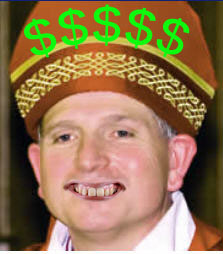G. K. Chesterton said: “A man is angry at a libel because it is false, but at a satire because it is true.”
But what is satire? The ever helpful Wikipedia tells us:
Satire is a genre of literature, and sometimes graphic and performing arts, in which vices, follies, abuses, and shortcomings are held up to ridicule, ideally with the intent of shaming individuals, and society itself, into improvement. Although satire is usually meant to be funny, its greater purpose is often constructive social criticism, using wit as a weapon.
While satire originated in Egypt, it became more fully developed in Ancient Greece where it took one of two forms: Satire after the style of Horace: humorous, self-deprecating commentary that laments contemporary follies; or after the style of Juvenal. Juvanalian satire is scornful, sarcastic and polarised.
Unbeknownst to me I have unwittingly succumbed to the influence of Rowan Williams whose ten year stint as Anglican in Chief has insidiously infused my thinking with via media muddle. I have concocted an Hegelian middle ground between Horatian and Juvenalian satire, one that is both excruciatingly funny while being bitingly sarcastic. I have empirical evidence of this: my 11 year old granddaughter roars with laughter at my musings (no, I don’t show her all of them), confirming the former and I find myself deep in the mephitic bowels of an ecclesiastical lawsuit, confirming the latter.
For those who think some of the things I have written are a trifle tasteless, I recommend a quote from Malcolm Muggeridge – whom I met briefly in the 70s and, you will be relieved to know, I irritated by asking impertinent questions:
Good taste and humour are a contradiction in terms, like a chaste whore.




